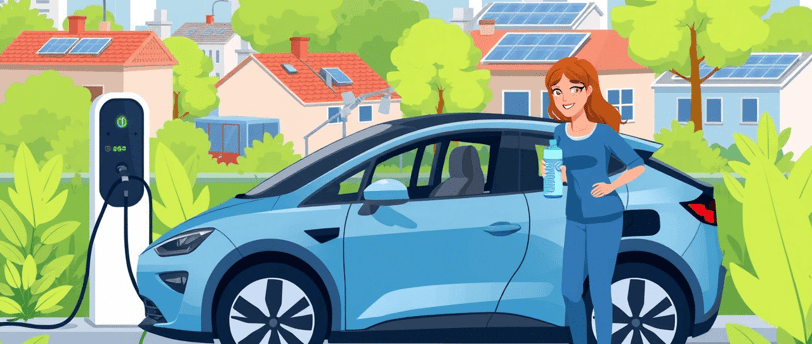The Rise of Electric Cars: Are We Finally Saying Goodbye to Gas Guzzlers?
Electric cars are becoming more and more popular. We look at why this is happening and whether they will eventually replace traditional gasoline cars.
TECHNOLOGY
4/3/20253 min read


For over a century, gasoline-powered cars have been the dominant form of personal transportation. We're used to the sound of the engine, the smell of gasoline, and the routine of filling up at the gas station. But things are starting to change. Electric cars, once seen as a niche technology for environmental enthusiasts, are now becoming increasingly common on our roads. More and more people are choosing to go electric, and the question on many minds is: are we finally saying goodbye to gas guzzlers?
There are several reasons why electric cars are becoming so popular. One of the biggest drivers is environmental concerns. Traditional gasoline cars release harmful emissions into the atmosphere, contributing to air pollution and climate change. Electric cars, on the other hand, produce zero tailpipe emissions. While the electricity used to charge them might come from sources that generate emissions, the overall environmental impact of electric cars is generally lower, especially as renewable energy sources like solar and wind power become more prevalent.
Another key factor is cost savings. While the initial purchase price of an electric car can sometimes be higher than a comparable gasoline car, the running costs are often much lower. Electricity is typically cheaper than gasoline, so you'll save money on fuel. Electric cars also have fewer moving parts than gasoline cars, which means they generally require less maintenance. You won't need to worry about oil changes, transmission fluid flushes, or many of the other maintenance tasks associated with traditional cars. Over the long term, the total cost of ownership for an electric car can be significantly lower.
Technological advancements have also played a crucial role in the rise of electric cars. Battery technology has improved dramatically in recent years, leading to longer driving ranges and faster charging times. Early electric cars often had limited range, making them impractical for long trips. But now, many electric cars can travel hundreds of miles on a single charge, and charging infrastructure is becoming more widespread, making it easier to take longer journeys.
Government incentives and regulations are also helping to promote the adoption of electric cars. Many countries and regions offer tax credits, rebates, and other incentives to encourage people to switch to electric vehicles. Some governments are also setting targets for phasing out the sale of new gasoline cars in the coming decades, signaling a clear shift towards electric mobility.
The driving experience of electric cars is also a major draw for many people. Electric cars offer instant torque, which means they can accelerate very quickly. They also tend to have a smooth and quiet ride, as there is no engine noise or vibrations. Many electric cars also come equipped with the latest technology and features, making them appealing to tech-savvy consumers.
However, despite their growing popularity, electric cars still face some challenges. One of the biggest is the charging infrastructure. While the number of charging stations is increasing, it's still not as widespread as gas stations. Finding a place to charge your car, especially on long trips, can sometimes be a concern for potential buyers. However, this infrastructure is rapidly expanding, with more and more charging stations being installed in public places, workplaces, and homes.
Another challenge is the charging time. While you can "fill up" a gasoline car in a matter of minutes, charging an electric car can take longer, depending on the type of charger and the size of the battery. However, fast-charging technology is improving, and it is becoming possible to add a significant amount of range to an electric car in under an hour. For many people, charging at home overnight is sufficient for their daily driving needs.
The initial cost of electric cars can still be a barrier for some buyers. While prices are coming down, they are still generally higher than comparable gasoline cars. However, as battery technology continues to improve and production scales up, the cost of electric cars is expected to decrease further.
There are also concerns about the sustainability of battery production. The batteries used in electric cars require materials like lithium and cobalt, and the mining and processing of these materials can have environmental and social impacts. However, there is ongoing research into developing more sustainable battery technologies and improving recycling processes.
So, are we finally saying goodbye to gas guzzlers? While it's unlikely that gasoline cars will disappear completely overnight, the trend towards electric mobility is undeniable. Electric cars offer significant environmental and economic benefits, and technological advancements are constantly improving their performance and practicality. With increasing government support and growing consumer demand, it seems likely that electric cars will play an increasingly dominant role in the future of transportation.
The transition won't happen all at once, and there will likely be a mix of gasoline, hybrid, and electric vehicles on our roads for some time to come. But the momentum behind electric cars is strong, and it's exciting to think about a future with cleaner air, quieter roads, and a reduced reliance on fossil fuels. The era of the electric car has arrived, and it looks like it's here to stay.
Explore
Discover fascinating articles on interesting topics daily.
Engage
© 2025. All rights reserved.
